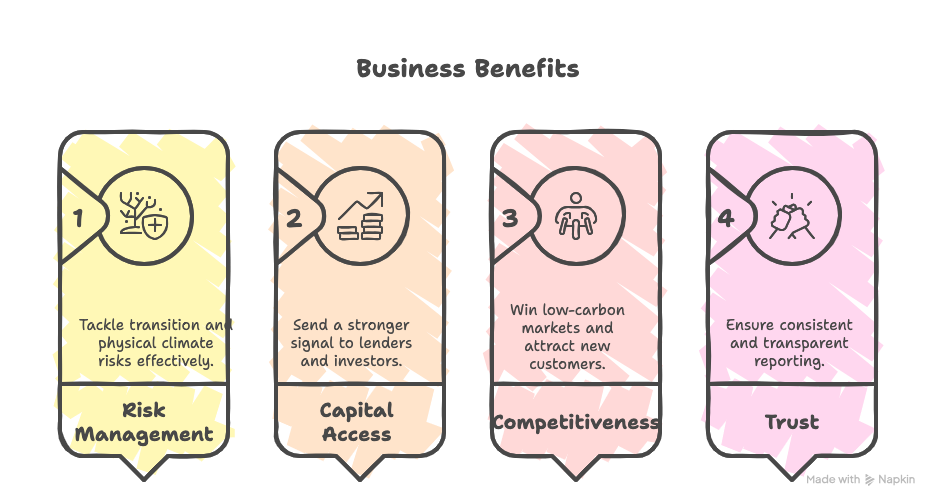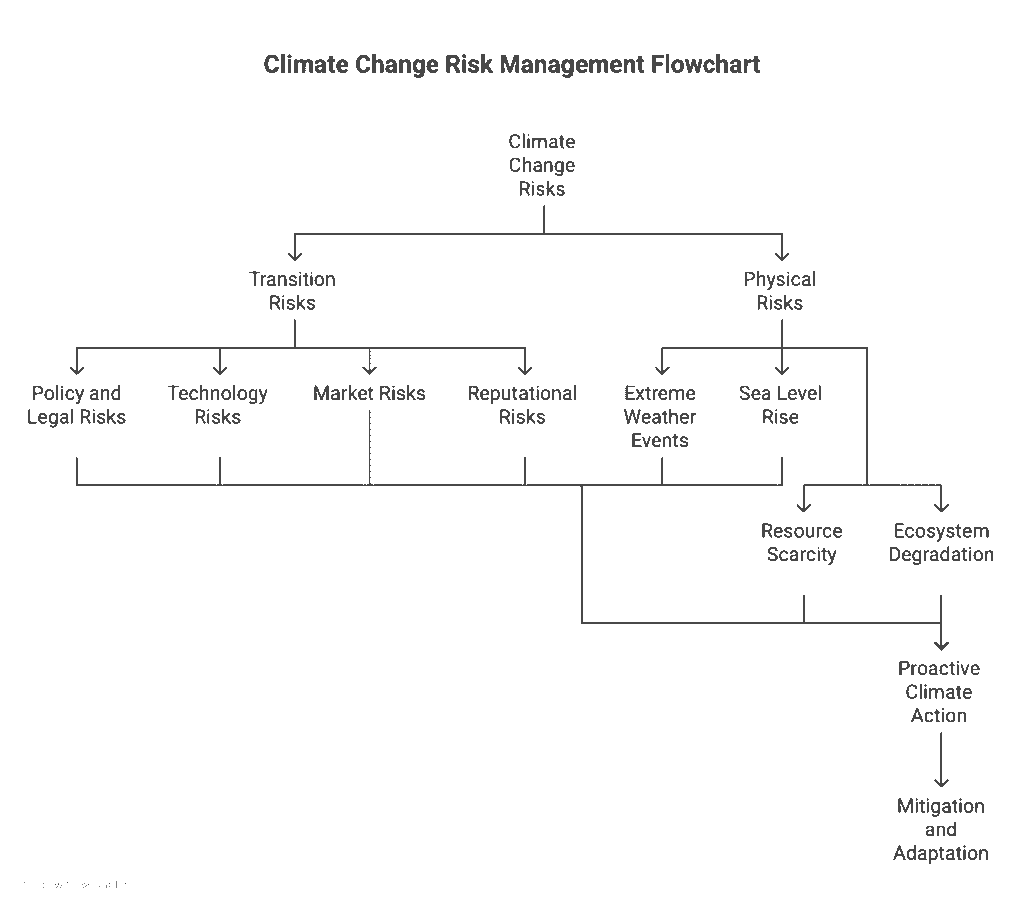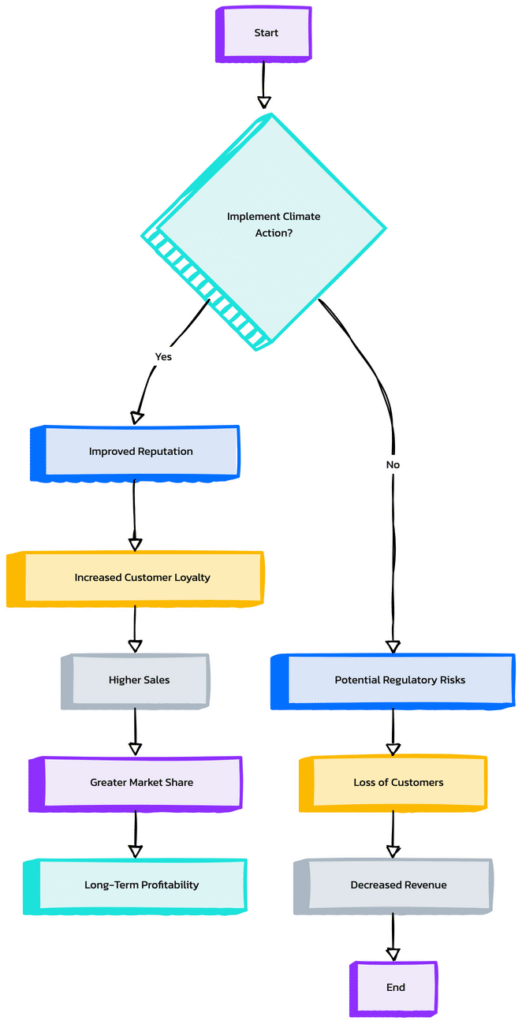This document outlines the tangible benefits companies can realize by proactively addressing climate change. These advantages span risk management, access to capital, enhanced competitiveness, and increased stakeholder trust through transparent reporting. By embracing sustainable practices and mitigating their environmental impact, businesses can unlock significant value and position themselves for long-term success in a rapidly evolving global landscape.

Risk Management: Tackling Transition and Physical Climate Risks
Climate change presents two primary categories of risks to businesses: transition risks and physical risks. Proactive climate action allows companies to effectively manage and mitigate these threats, safeguarding their operations and assets.

Transition Risks: These risks arise from the shift towards a low-carbon economy. They include:
- Policy and Legal Risks: Governments worldwide are implementing stricter environmental regulations, carbon pricing mechanisms, and emissions standards. Companies that fail to adapt to these changes face potential fines, legal challenges, and increased compliance costs. By proactively reducing their carbon footprint and aligning with climate policies, businesses can minimize these risks.
- Technology Risks: The transition to a low-carbon economy necessitates the adoption of new technologies and processes. Companies that lag behind in this technological shift risk becoming obsolete and losing market share to more innovative competitors. Investing in research and development, adopting clean technologies, and embracing circular economy principles can help businesses stay ahead of the curve.
- Market Risks: Consumer preferences are increasingly shifting towards sustainable products and services. Companies that fail to meet this demand risk losing customers to competitors with stronger environmental credentials. By developing eco-friendly products, reducing waste, and promoting sustainable practices, businesses can attract and retain environmentally conscious consumers.
- Reputational Risks: Public awareness of climate change is growing, and companies are increasingly being held accountable for their environmental impact. Negative publicity and consumer boycotts can damage a company’s reputation and erode its brand value. By demonstrating a commitment to sustainability and transparently reporting their environmental performance, businesses can build trust with stakeholders and protect their reputation.
Physical Risks: These risks arise from the direct impacts of climate change, such as:
- Extreme Weather Events: Rising temperatures, more frequent and intense heatwaves, droughts, floods, and storms can disrupt supply chains, damage infrastructure, and impact employee safety. Companies can mitigate these risks by investing in climate-resilient infrastructure, diversifying their supply chains, and developing emergency preparedness plans.
- Sea Level Rise: Coastal businesses and infrastructure are particularly vulnerable to sea level rise, which can lead to flooding, erosion, and displacement. Companies can adapt to this risk by relocating facilities, investing in coastal protection measures, and incorporating sea level rise projections into their long-term planning.
- Resource Scarcity: Climate change can exacerbate water scarcity, food shortages, and other resource constraints. Companies that rely on these resources can mitigate this risk by improving resource efficiency, diversifying their supply sources, and investing in sustainable resource management practices.
- Ecosystem Degradation: Climate change can damage ecosystems, impacting biodiversity and the provision of essential ecosystem services. Companies that depend on these services, such as agriculture and tourism, can mitigate this risk by supporting conservation efforts, promoting sustainable land management practices, and reducing their impact on biodiversity.
Capital Access: Stronger Signal to Lenders and Investors
Investors and lenders are increasingly incorporating environmental, social, and governance (ESG) factors into their investment decisions. Companies with strong climate performance are viewed as less risky and more attractive investments.
- Attracting ESG Investors: ESG investors are actively seeking companies that are committed to sustainability and have a positive impact on the environment and society. By demonstrating a strong commitment to climate action, companies can attract these investors and gain access to a larger pool of capital.
- Lowering the Cost of Capital: Lenders are increasingly offering preferential interest rates to companies with strong ESG performance. By reducing their carbon footprint and improving their environmental performance, businesses can lower their cost of capital and improve their financial performance.
- Accessing Green Finance: Green bonds and other green financial instruments are becoming increasingly popular. Companies that are investing in climate-friendly projects can access these funds to finance their sustainability initiatives.
- Improving Credit Ratings: Credit rating agencies are increasingly incorporating ESG factors into their credit ratings. Companies with strong climate performance are more likely to receive higher credit ratings, which can lower their borrowing costs and improve their access to capital.
Competitiveness: Winning Low-Carbon Markets and Customers
The transition to a low-carbon economy is creating new markets and opportunities for businesses that are prepared to capitalize on them.
- Developing Innovative Products and Services: Companies that invest in research and development and develop innovative low-carbon products and services can gain a competitive advantage in the emerging green economy.
- Improving Resource Efficiency: By reducing waste, conserving energy, and using resources more efficiently, businesses can lower their operating costs and improve their profitability.
- Strengthening Brand Reputation: Consumers are increasingly choosing to support companies that are committed to sustainability. By demonstrating a commitment to climate action, businesses can strengthen their brand reputation and attract new customers.
- Attracting and Retaining Talent: Employees are increasingly seeking to work for companies that are making a positive impact on the world. By demonstrating a commitment to sustainability, businesses can attract and retain top talent.
- Gaining Access to New Markets: Governments and businesses are increasingly prioritizing sustainable products and services in their procurement decisions. By developing eco-friendly products and services, businesses can gain access to new markets and increase their sales.
Trust: Consistent, Transparent Reporting (GRI/BRSR/CDP Ready)
Transparent and consistent reporting on climate-related performance is essential for building trust with stakeholders and demonstrating a commitment to sustainability.
- Meeting Stakeholder Expectations: Investors, customers, employees, and other stakeholders are increasingly demanding greater transparency on climate-related issues. By reporting their environmental performance in a clear and consistent manner, businesses can meet these expectations and build trust.
- Benchmarking Performance: Reporting frameworks such as the Global Reporting Initiative (GRI), Business Responsibility and Sustainability Reporting (BRSR), and the Carbon Disclosure Project (CDP) provide a standardized way for companies to measure and report their environmental performance. By using these frameworks, businesses can benchmark their performance against their peers and identify areas for improvement.
- Improving Decision-Making: Transparent reporting provides companies with valuable data that can be used to improve decision-making and track progress towards sustainability goals.
- Enhancing Accountability: Transparent reporting holds companies accountable for their environmental performance and encourages them to take action to reduce their impact.
- Building Credibility: Consistent and transparent reporting builds credibility with stakeholders and demonstrates a genuine commitment to sustainability.
In conclusion, proactive climate action offers companies a multitude of benefits, ranging from mitigating risks and securing capital to enhancing competitiveness and building trust. By embracing sustainable practices and transparent reporting, businesses can position themselves for long-term success in a world increasingly shaped by climate change.

